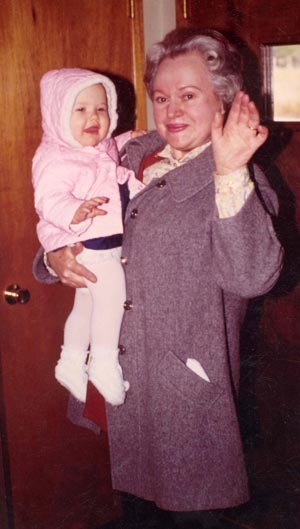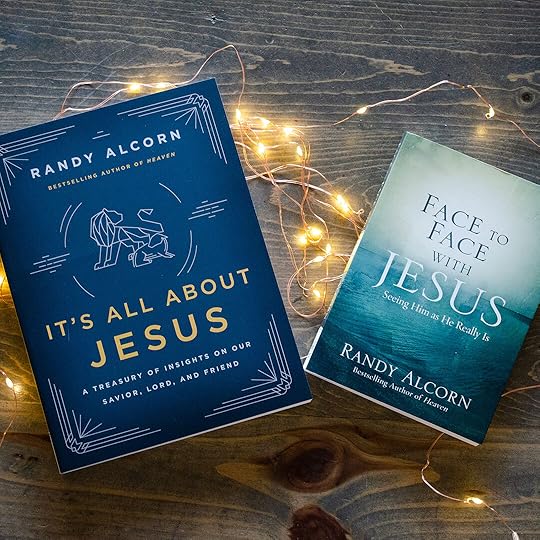Randy Alcorn's Blog, page 45
December 26, 2022
A 7-Year-Old Reader’s Letter Reminds Us of the Heart of Giving and Making Eternal Investments in Others’ Lives

Recently our ministry got a letter in the mail from a 7-year-old reader. She wrote,
“To Randy Alcorn: thank you for the book Heaven for Kids. I learned so much! It encouraged me to help others, like bring people lemon juice, and give missionaries money, and send this letter to you! I could never think of all that. It also helped me learn lots of other things! Thanks again! P.S. I’m getting Heaven also from the library.”
Her note is precious beyond words! And it captures the heart. We asked her parents’ permission to share her handwriting:

When I read a note like this, I can’t help but think of all the faithful supporters of our ministry, who have prayed for me as I wrote books, including Heaven and Heaven for Kids. As I shared in a blog earlier this month, I think what Jesus said in Matthew 25 has far greater implications than we realize:
“Then the righteous will answer him, ‘Lord, when did we see you hungry and feed you, or thirsty and give you something to drink? When did we see you a stranger and invite you in, or needing clothes and clothe you? When did we see you sick or in prison and go to visit you?’
“The King will reply, ‘Truly I tell you, whatever you did for one of the least of these brothers and sisters of mine, you did for me.’” (Matthew 25:37-40)
His followers don’t know how their words and actions affected not just people here and there that they don’t remember, but how they have affected Jesus Himself: “Whatever you did for others, you did for me.” It’s not just that the righteous didn’t realize they were doing what they did for Jesus; I think they are clueless about the depths to which they have affected thousands of people throughout their lifetimes, and not only through direct actions, but through giving and praying. When you have lived a godly life over a period of decades, you can’t begin to remember most of the impactful things you have done, and many of them you haven’t just forgotten, but never realized were that impactful in the first place.
I love the picture of Jesus rewarding us someday for things He will have to remind us we did! I also love the thought that when we see people in Heaven, some will thank us for giving to them, including those we never met directly. Certainly God sees, values, and remembers our every act of generosity, even when we don’t.
Likewise, those who have supported Eternal Perspective Ministries won’t know the far-reaching impact of their giving until eternity. How many readers have been touched by my books, which I was able to write because of the support and prayers of our donors? How many prisoners have heard the Good News of forgiveness in Jesus through books EPM has sent to prisons across the U.S.? How many readers have been impacted by the articles and resources available on our website and on social media? How many lives have been changed because of the book royalties given away? And all those who have supported our ministry have played a significant role in helping them.
In that world awaiting us, we will join Jesus, our greatest treasure, and be reunited with beloved family and friends who know Him. In addition, we will meet many people for the first time, including those forever touched by our investments in their lives. All these people—old acquaintances and new ones—will be our joy and our crowns (Philippians 4:1; 1 Thessalonians 2:19).
If you’ve found our blog, books, articles, social media posts, and/or magazine to be helpful, would you prayerfully consider supporting EPM and being a part of this eternity-shaping ministry in 2023? If you wish to make a year-end, tax-deductible donation, please note donations postmarked no later than December 31, or received online at epm.org/donate by 11:59 p.m. PT on December 31, will be included on this year’s tax receipts.
Whether or not you can give to EPM, may God richly bless you in the coming year with many opportunities to make eternal investments through your time, actions, and treasure.
(Please note: EPM’s philosophy is based on the words of Jesus in Matthew 10:8: “Freely you have received; freely give.” God graciously provides for us, so please do not feel any obligation to support us. We realize it isn’t God’s will for everyone to support every ministry! We are glad to share freely with anyone what God has given to us.)
December 23, 2022
The Best Part of Christmas Is Immanuel, “God with Us”

In the Old Testament, we read how God kept reaching down to His people: “The Lord…sent word to them through his messengers again and again, because he had pity on his people…But they mocked God’s messengers, despised his words and scoffed at his prophets” (2 Chronicles 36:15-16).
The prophets foretold the coming of Messiah. Yet centuries of oppression and suffering passed, and many lost hope. In every generation there were people like Simeon and Anna who longed for and prayed for Messiah’s coming. And finally, when the Redeemer’s absence became unbearable, He came: “But when the set time had fully come, God sent his Son, born of a woman” (Galatians 4:4).
God didn’t stay way off in Heaven, but came down to live among us on Earth, which He had handmade for us to live on. John 1:14 says, “The Word became flesh and dwelt among us.”
God Himself, with Us
Jesus promised His disciples, “I will come back and take you to be with me that you also may be where I am” (John 14:3). Do you hear in this verse how much He wants to live with us? After our deaths and before the resurrection, we will live with Him in the present Heaven. But that’s not the end of the story!
Revelation 21:3 says in reference to the New Earth, “God himself will be with his people.” Why does it say God Himself? Because God won’t merely send us a delegate. He won’t just send down the angel Gabriel to represent Him. He Himself will actually come down from Heaven to live among us on the New Earth.
Since Jesus will be His resurrected self forever, His body will be as perfectly suited for the New Earth. After Jesus had ascended in His body to the present Heaven, the angels said, “Men of Galilee, why do you stand here looking into the sky? This same Jesus, who has been taken from you into heaven, will come back in the same way you have seen him go into heaven” (Acts 1:11). “This same Jesus” will come back “in the same way”? What way? Physically, in His resurrected body, this time to live forever on Earth! (Some believe He will first return to the present earth still under the Curse during a 1,000 year kingdom known as the Millennium; others who are amillennial believe there’s not a literal 1,000 year kingdom on this earth, but that after the return of Christ there is the resurrection and final judgment of Revelation 20 and then the immediate beginning of eternal life on the New Earth.)
Immanuel does not mean “us with God.” It means “God with us.” Where will He be with us? In the eternal home He is preparing for us, and over which He will reign as the eternal God-man.
Heaven Will Be on Earth
It’s sometimes said, “This world is not our home.” It’s true, but it’s a half-truth. We should qualify it to say, “This world—as it now is, under the curse—is not our home.” But we should also say, “This world—as it was originally—was our home.” And we should add, “This world—as it one day will be, delivered from the curse—will be our home.”
When we die and go to live in the present Heaven, we’ll be with Christ, and we’ll be full of joy. But it won’t be our permanent home. It will be a layover, not our final destination. Those now with the Lord are looking forward to their bodily resurrection and relocation to the New Earth, where Christ will reign forever.
The incarnation of Christmas isn’t temporary; it’s permanent. Christ rose in a glorified human body which He will have forever. It’s not that Jesus became a baby at Christmas, and then 33 years later came the resurrection and ascension and then He suddenly stopped being a man. No, the second member of the triune God will be a human being for all eternity, reigning from a throne on the New Earth.
Often we think of Heaven as our going up into a disembodied angelic realm to live with God in His place. But the Bible says the ultimate Heaven will be God coming down from Heaven to live with us in our place—the New Earth. That’s the place He’s preparing for us.
We are made for a person and a place. Jesus is the person. Heaven is the place. And the resurrected Jesus will bring Heaven down to the resurrected earth.
Have you ever imagined what it would be like to walk the earth with Jesus, as the disciples did? Have you ever wished you had that opportunity? You will—on the New Earth. Jesus promised we would eat and drink with Him in His Kingdom. To eat a meal with Jesus will be to eat a meal with God, because He is Immanuel, God with us.
The best part of Christmas is not the presents we receive, but the presence of God with us. Christmas means that God loved us so much He came to live with us, and die for us, so that we can live with Him forever.
The Great Reunion Awaits
This will be my first Christmas without Nanci since 1968, the year we met. It will also be her first Christmas in the direct presence of Jesus. Writing that just filled my eyes with tears of overwhelming joy. She is having Christmas with the One it’s named after, with the One who bought our way to Heaven, with the One who is both her best friend, and mine.
It will also be her first Christmas with her mom since 2000! Her first with her dad since 2005. And her first with my mom, with whom she also had a wonderful relationship, since 1980! She and our friends Michele Norquist and Erin Seymour will have their first Christmas with Jesus on the same day. I can see them together now. That fills my heart up.
She always wondered if she had a miscarriage, and if so, she’ll have Christmas with our child I haven’t yet met. We know our daughter had a miscarriage, and I’m sure Nanci has already met our grandchild, and this is their first Christmas together too. She has grandparents and aunts and uncles and people whose lives she impacted and who impacted hers. If not by now, for sure she’ll eventually see Marden and Ruth Wickman, Paul Siwek, Greg Coffey, Jerry Hardin, John Kohlenberger, Leona Bryant, Patti Atkins, Garland and Emma Gabbert, Cal and Helen Hess, Jim and Marguerite Spinks, Bryon and Dorothy Weber, and so many others who were once part of our lives, people we missed, but who Nanci now doesn’t have to miss!
And then, there’s people she may or may not have met yet but whose lives touched hers: Charles and Susannah Spurgeon, Jack (C.S.) and Joy Lewis, Francis and Edith Schaeffer, Keith Green, and the many Puritans she loved to read. I can’t wait for her to introduce me to thousands and thousands of people whose names I’ve only known. What will it be like to meet them face to face and worship Jesus together? What will it be like to be forever with the God whose very name promises He will be with us now and forever?
So, yes, I am sad to not spend Christmas with Nanci, but I am SO, SO HAPPY when I think of her being with her family and friends and the larger family of God who have gone before her. I can honestly say my joy for her outweighs my sadness of having to await my next Christmas with her.
Christ promises He will wipe away all our tears, and there will be no more death or suffering, no final goodbyes. He bought that promise with His blood, so it is not mere wishful thinking—it is written in the stone of eternity. The great reunion awaits me, and if you know Jesus, the great reunion awaits you too.
If you don’t know Him, place your faith in Him right now. If we at this ministry can help you come to know Him, contact us . This could be the last year, month, day, or minute of your life—for certain, one of these years, months, days, or minutes will be. For all who know Him, God will live with you and your spiritual family forever, for now in the present Heaven, and forever on the redeemed earth in the redeemed universe. That’s the best Christmas present anyone could ever receive!
Merry Christmas to you, and all glory to Immanuel, the God who is with us, and will be with us forever.
Photo by Niklas Ohlrogge on Unsplash
December 21, 2022
What Changed Scrooge?

When the classic Dickens story A Christmas Carol begins, we meet Ebenezer Scrooge. This wealthy miser is caustic, complaining, horrendously greedy . . . and profoundly unhappy. (His life illustrates how the word miser is connected with miserable.)
Scrooge’s loyal, joyful nephew says of his stingy uncle, “His offences carry their own punishment, and I have nothing to say against him. . . . Who suffers by his ill whims? Himself, always.”
After a radical transformation from his three visions, Scrooge walks through the streets of London freely distributing his wealth to the needy. He’s giddy with delight. Grace will do that to you! (Second Corinthians 8–9, the longest biblical passage on giving, is full of references to grace.)
This man who only one day earlier scoffed at the idea of charity now takes his greatest pleasure in giving. The most miserable human being you could imagine suddenly erupts with joy.
Had Ebenezer Scrooge decided to give away money only out of a guilt-driven sense of obligation, he wouldn’t have been full of gladness. The story’s greatness is in the inseparability of his newfound generosity and his happiness.
What caused Scrooge’s joy-filled transformation? Gaining an eternal perspective. Through supernatural intervention, he was allowed to see his past, present, and still-changeable future through the eyes of eternity. (Let’s ask God for the same insight!)
On the story’s final page, Dickens says of Scrooge, “Some people laughed to see the alteration in him, but he let them laugh, and little heeded them. . . . His own heart laughed: and that was quite enough for him. . . . And it was always said of him, that he knew how to keep Christmas well, if any man alive possessed the knowledge.”
Don’t Miss Your Chance
Jack Alexander says, “Our giving went to a whole ’nother level when one day I got my first bonus ever. It was $5,000. I organized a dinner at Wendy’s with Lisa and my two little boys to tell them.”
When he shared the news with his family, Lisa responded, “You won’t believe what happened today.” She said they had received a letter from a nurse in Sudan who needed to buy a Jeep. The cost of that vehicle? Five thousand dollars!
Jack’s initial response was, “Noooooo . . .”
But Lisa said these fateful words: “Will you pray about it?”
“God met me in that prayer, and he showed me two things,” Jack says. “First, he showed me . . . the value of probably hundreds of kids who could get inoculations, and people [who] could be helped. I was just overwhelmed with what a great investment it was to give that money away. The second thing I really knew was from the Holy Spirit because I got this overwhelming sense . . . that this was a privilege, that God . . . had chosen us to do it and join his work. And we gave the money away.”
Like Scrooge, as long as we live on Earth, we’re still in the land of second chances. As long as we’re here, we’re each still writing our life’s story. No one knows how the final chapter will end until it’s ended.
At our deaths, the appraisal can and will finally be made. What have we done with our lives? Have we invested them in eternity? Have we carved into the minds of our families and our church and our community a burning image of the Lord Jesus Christ? Or have we poured our lives down the rat holes of prideful ambition, irresponsibility, godlessness, materialism or empty religion?
2 Peter 3 tells us this world and everything in it is going to burn. There’s a coming holocaust of things. Revelation 18 speaks of the economic world system of materialism, called “Babylon the Great.” If that’s what you’re investing your life in, then go ahead and be depressed. You’ve got a lot to be depressed about!
Our denial of this obvious reality is striking. I once walked by a store displaying one line of silverware called “Eternal Gold” and another “Eternal Silver.” (They weren’t referring to 1 Corinthians 3:12-14). Another time, I saw a magazine advertisement in which a woman stared at a diamond and asked, “What else will be mine for the next thousand years?”
When I was a pastor, a couple came to my office and told me they wanted to be able to give more money to the church and to missions. “But we’ve always had this dream for a beautiful home in the country,” they added, “and we can’t seem to shake it. Is that wrong?”
No, it isn’t. In fact, the dream of a perfect home is from God. It’s just that such a dream cannot and will not be fulfilled in this life. Our dream house is coming; we don’t have to build it here. In fact, we can’t. Any dream house we try building here will eventually be ravaged by time, floods, earthquakes, tornadoes, carpenter ants, or freeway by-passes. And who would want to divert kingdom funds to a dream house on Earth if you understand it’s going to burn to the ground, with no insurance company left to cover the loss?
Does that sound depressing? It shouldn’t. What would be depressing is if we couldn’t use our present lives and resources to make a difference for eternity. But we can! What would be depressing is if this world was our home. But it isn’t! We get to use our resources to send building materials ahead to the Carpenter building our dream house in Heaven!
C.S. Lewis wrote, “Our Father refreshes us on the journey with some pleasant inns, but will not encourage us to mistake them for home.”
Until the day when the ink dries on the manuscript of your life—which could be today or next week or next year or decades from now—what must you do to write the best ending to your story?
In the time you have left on the old earth, how will you edit your own obituary as it will be viewed from the New Earth?
God’s Spirit can give us the same life-changing eternal perspective the three Christmas spirits gave Scrooge. We can learn the vital importance of giving while we’re still living. He has given His Word and His indwelling Holy Spirit to teach and guide us, and to liberate us to experience the real life that pours itself out in generous giving.
“God bless us, every one!”
See Randy's book Giving Is the Good Life and more resources on money and giving.
Photo by Nadi Lindsay
December 19, 2022
Can Cancer Be God’s Servant? What I Saw in My Wife’s Last Four Years

In March, my beloved wife, Nanci, lost her four-year battle with colon cancer. All 54 years I’ve known her, Nanci loved Jesus. But from a front-row seat, I watched a wonderful—and supernatural—change in those last four years.
In 2019, Nanci wrote to a friend and fellow cancer sufferer,
The cancer battle has been tough. However, my time with the Ancient of Days (one of my favorite names for God) has been epic! He has met me in ways I never knew were possible. I have experienced His sovereignty, mercy, and steadfast love in tangible ways. I now trust Him at a level I never knew I could.
I saw Nanci meditate on Scripture daily, read great books about God, and journal—writing out verses, powerful quotations from Spurgeon and many others, and personal reflections. One unforgettable morning, after meditating on Psalm 119:91, “All things are your servants,” she shared with me what she’d just written:
My cancer is God’s servant in my life. He is using it in ways He has revealed to me and in many more I have yet to understand. I can rest knowing my cancer is under the control of a sovereign God who is good and does good.
Brokenhearted and Thankful
Nine months later, at Nanci’s request and on short notice, our daughters and their families gathered to hear her speak final words of overflowing love for us and unswerving trust in her sovereign King.
As one of our grandsons sat beside her, listening to her struggling to speak and to me reading powerful words from her journals, he said, “Grams, if you can trust God in this, I know I can trust Him in whatever I’ll go through.” Another grandson told her, “I will never forget what you said to us today.”
Exactly one week later, I held her hand and watched her take her last breath in this world under the curse.
Every day during those four years, I witnessed God’s sanctifying and happy-making work in my wife: “We rejoice in our sufferings, knowing that suffering produces endurance, and endurance produces character, and character produces hope . . . because God’s love has been poured into our hearts through the Holy Spirit” (Romans 5:3–5).
Nanci and I—and thousands worldwide—prayed daily for her healing. God’s final answer was to rescue her from suffering and bring her into his presence where it’s “better by far” (Philippians 1:23). Through her afflictions, He achieved in her an eternal weight of glory that far outweighs them all (2 Corinthians 4:17). She praised Jesus for it, and I will forever do the same, though I miss her immensely.
Why God Permits What He Does
When our ministry posted Nanci’s words, “My cancer is God’s servant,” someone responded, “WHAT? God does NOT give people cancer. Jesus bore our sicknesses and carried our pains on the cross.”
That reader is not alone in trying to distance God from suffering. But by saying sickness comes only from Satan and the fall, not from God, we disconnect Him from our suffering and His deeper purposes. God is sovereign. He never permits or uses evil arbitrarily; everything He does flows from His wisdom and ultimately serves both His holiness and love.
Joni Eareckson Tada often shares the words of her friend Steve Estes: “God permits what he hates to accomplish what he loves.” God’s “permitting” something is far stronger than it may sound. After all, whatever God permits actually happens; what he doesn’t permit doesn’t happen.
In the final chapter of Job, God reveals that Job’s family and friends “showed him sympathy and comforted him for all the evil that the Lord had brought upon him” (Job 42:11). The author told us from the beginning that Job’s troubles were Satan’s idea and actions. Yet the inspired wording indicates Satan’s efforts were, indirectly by sovereign permission, God’s own doing. Many find this truth disturbing, but properly understood, it should be comforting. What should be profoundly disturbing is the notion that God stands by passively while Satan, evildoers, diseases, and random accidents ruin the lives of His beloved children.
Charles Spurgeon suffered terribly from depression, gout, rheumatism, neuritis, and a burning kidney inflammation. Yet he said, “It would be a very sharp and trying experience for me to think that I have an affliction which God never sent me . . . that my trials were never measured out by him, nor sent to me by his arrangement of their weight and quantity.”
Mercy Outstrips Hardship
Nanci and I experienced many glimpses of God’s sovereign purposes for years before her cancer diagnosis. We saw that my becoming an insulin-dependent diabetic 35 years ago was God’s plan to increase my dependence on Him. And we saw, 30 years ago, that a lawsuit by an abortion clinic for $8.2 million was His way of moving me from pastoring a church we loved into a ministry that reaches further than we ever imagined.
God’s hands were not tied by my genetic propensity for type-1 diabetes (the result of the curse), or by the vengeance of child-killers (the result of human sin and demonic strategy). He didn’t merely “make the best of bad situations.” He took bad situations and used them for His glory and our highest good. His sovereign grace far outstripped our hardships.
If this were not true, anyone facing a terminal illness would have to believe they experienced bad luck, and that God is either not as powerful or not as loving as He claims to be. Parents who have lost a child would have to believe the death was a meaningless accident, and that it wouldn’t have happened if only the child hadn’t been at that place at that time, or if that man hadn’t been driving drunk, or if a thousand other circumstances had been different.
If onlys and what ifs can rule our lives and drive us crazy. Instead, embracing God’s higher purposes—even when invisible to us in painful and tragic events—affirms God’s greatness. This is not fatalism. It is trust in the character and promises of our faithful, all-wise God.
My friend David O’Brien told me, with his slurred and laboring voice, that God used cerebral palsy to deepen his dependence on Christ. Was he better off? He lived convinced that his 81 years of suffering were no cosmic accident or satanic victory, but a severe mercy from the good hand of almighty God.
Reasons Outside Our Sight Lines
By God’s grace, Nanci fixed her attention on His attributes. Only eight months into her cancer journey, she wrote,
I honestly would not trade this cancer experience to go back to where I was. These last months have been used by God to propel me into a deeper understanding and experience of his sovereignty, wisdom, steadfast love, mercy, grace, faithfulness, immanency, trustworthiness, and omnipotence.
Psalm 119:71 says, “It was good for me that I was afflicted, that I might learn your statutes.” If affliction was good for the psalmist, then withholding that affliction would have meant withholding good. The universe is first and foremost about the purposes, plans, and glory of God. God sees eternal purposes and plans and knows ultimate good in ways we cannot.
Our sovereign God weaves millions of details into our lives. He may have one big reason, or a thousand little ones, for bringing a certain person or success or failure or disease or accident into our lives. His reasons often fall outside our present lines of sight. If God uses cancer or a car accident to conform us to Himself, then regardless of the human, demonic, or natural forces involved, He will be glorified.
“O great and mighty God, whose name is the Lord of hosts, great in counsel and mighty in deed” (Jeremiah 32:18–19). God is at work behind the scenes, and one day we will understand our suffering’s hidden purposes.
Will You See What She Saw?
Without a doubt, as I saw so clearly even when my tears overflowed, cancer served God’s purposes in Nanci’s life. I said at her service, “The most conspicuous thing about Nanci in her cancer years was her wonderfully big view of God, which she fed from Scripture and great books. The more she contemplated God’s love and grace and sovereignty, the more her trust in him grew.”
So I said to our gathered family, friends, and church members—many of them facing their own painful trials—what I sensed God saying to me: “That huge, beautiful, and transforming view of God is yours for the taking. So why not spend the rest of your life pursuing it?”
For more related to the subject of suffering, see Randy’s book If God Is Good , as well as the devotional 90 Days of God’s Goodness and book The Goodness of God .
December 16, 2022
The Inn Had No Room; Does Your Heart?

“Mary gave birth to her firstborn son and wrapped him in bands of cloth, and laid him in a manger, because there was no place for them in the inn” (Luke 2:7 NRSV).
Paul Tripp, in Come Let Us Adore Him, writes that “the Christmas story; rather, the entire redemptive story hinges on one thing—the eternal willingness of Jesus.”
He says:
Without his willingness, you and I would be without hope and without God. Without his willingness, we would be left with the power and curse of sin. Without his willingness we would be eternally damned. During this season of celebrating don’t forget to stop and celebrate your Savior’s willingness. His willingness is your hope in life, death, and eternity.
But there is even more to be said. The Advent willingness of Jesus is your guarantee that he continues to be willing today. Right here, right now, he is willing to love you on your very worst day. Right now he is willing to forgive you again and again. Here and now he is willing to be patient as you continue to grow and mature. Right now he is willing to battle on your behalf against evil within and without. Here and now he is willing to teach you through his Word. Now he is willing to supply every one of your spiritual needs. Now he is willing to be faithful even when you’re not. He, right now, is willing to empower you when you’re weak and to restore you when you’ve fallen. He is willing to comfort you when you are discouraged and protect you when you’ve stepped into danger. And he remains willing to do everything necessary to feed, guide, sustain, and protect you until eternity is your final home.
He gives us everything we need; have you given Him your heart?
Following are more thoughts about Jesus’ incarnational significance—the event of two millennia ago that affects us today and forever:
For to us a child is born, to us a son is given; and the government shall be upon his shoulder, and his name shall be called Wonderful Counselor, Mighty God, Everlasting Father, Prince of Peace. Isaiah 9:6 ESV
Now the birth of Jesus Christ took place in this way. When his mother Mary had been betrothed to Joseph, before they came together she was found to be with child …behold, an angel of the Lord appeared to him in a dream, saying, “Joseph, son of David, do not fear to take Mary as your wife, for that which is conceived in her is from the Holy Spirit.” Matthew 1:18-20 ESV
She looks into the face of the baby. Her son. Her Lord. His Majesty. At this point in history, the human being who best understands who God is and what he is doing is a teenage girl in a smelly stable. She can’t take her eyes off him. Somehow Mary knows she is holding God. So this is he. She remembers the words of the angel. “His kingdom will never end.”
He looks like anything but a king. His face is prunish and red. His cry, though strong and healthy, is still the helpless and piercing cry of a baby. And he is absolutely dependent upon Mary for his well-being.
Majesty in the midst of the mundane. Holiness in the filth of sheep manure and sweat. Divinity entering the world on the floor of a stable, through the womb of a teenager and in the presence of a carpenter. –Max Lucado
They all were looking for a king to slay their foes and lift them high. Thou cam’st, a little baby thing that made a woman cry. –George MacDonald
Late on a sleepy, star-spangled night, those angels peeled back the sky just like you would tear open a sparkling Christmas present. Then, with light and joy pouring out of Heaven like water through a broken dam, they began to shout and sing the message that baby Jesus had been born. The world had a Savior! The angel called it “Good News,” and it was. –Larry Libby
The birth of Jesus is the sunrise of the Bible. Towards this point the aspirations of the prophets and the poems of the psalmists were directed as the heads of flowers are turned toward the dawn. –Henry Van Dyke
For millions of people who have lived since, the birth of Jesus made possible not just a new way of understanding life but a new way of living it. –Frederick Buechner
The coming of Christ by way of Bethlehem manger seems strange and stunning. But when we take him out of the manger and invite him into our hearts, then the meaning unfolds and the strangeness vanishes. –Neil Strait
If Jesus were born one thousand times in Bethlehem and not in me, then I would still be lost. –Corrie ten Boom
What religion ever had a god that wanted such intimacy with us that He came with such vulnerability to us? …So vulnerable that His bare, beating heart could be hurt? Only the One who loves you to death. –Ann Voskamp
Long before silver bells jingled, Christmas lights twinkled, and horse-drawn sleighs went dashing through the snow, God reached down from heaven with the best gift of all. Love, wrapped in swaddling clothes. Hope, nestled in a manger. –Liz Curtis Higgs
Once in our world, a stable had something in it that was bigger than our whole world. –C.S. Lewis
Come to earth to taste our sadness, he whose glories knew no end; by his life he brings us gladness, our Redeemer, Shepherd, Friend. Leaving riches without number, born within a cattle stall; this the everlasting wonder, Christ was born the Lord of all. –Charles Wesley
No other God have I but Thee; born in a manger, died on a tree. –Martin Luther
Each of us is an innkeeper who decides if there is room for Jesus! –Neal A. Maxwell
Human logic says the King of kings should have been born in a palace, surrounded by luxury. Instead, the only door open to the humble Savior was a dirty stable. Amazingly, and revealingly, this was all by God’s design. Why is this good news for us? Because the Savior offered himself on our behalf, we won’t find “No Vacancy” signs in Heaven. If we’ve made our reservations by receiving God’s gift in Christ, then Heaven is wide open with plenty of room for all of us.
Quotes excerpted from It's All About Jesus: A Treasury of Insights on Our Savior, Lord, and Friend .
Photo by Jon Carlson on Unsplash
December 14, 2022
Parenting Well Through Christmas and Beyond

The joy of giving is something we can instill in the hearts of our children and grandchildren from a young age. I learned of a family sponsoring a child whose son asked them, “Can you help me sell my game system on eBay?” The parents were surprised since this was one of their son’s most prized possessions. They asked him why. “So I can send our [sponsored] child a Christmas present,” he replied.
I’m sure the boy was happy when he originally received his game system. I’m also sure that when he gave a Christmas present to a truly needy child across the globe, his happiness was both greater and more enduring.
The way of loving generosity may sound like dutiful obedience to the uninitiated. But generous givers know the truth: the habit of generosity ultimately explodes into enduring happiness.
God Created Us to Give
Arthur Brooks writes, “Our brains are actually wired to serve others. When we give charitable money and service to others, our brain releases several stress hormones which elevate our mood and cause us to feel happy. Serving and giving help to others makes us happier, healthier, more prosperous, and therefore greatly blessed and more successful than non-givers.”
To voluntarily serve someone—to give of ourselves—is to show love to them. When we model this and include our children in our generous giving of time and dollars, we include them in our joy.
God has wired us to love and serve others, and to find happiness in doing so. We should give because it’s right, but also because it’s smart. When we give, God is happy, those who receive our gifts are happy, and we’re happy. Everyone but Satan wins.
I spoke at a Jesus Film Project missions conference and invited a farmer from my church to join me. People from all over the world told powerful stories about how God had changed their lives through this ministry.
After the conference, this normally reserved man told me with bold passion, “I want to give as much as I possibly can to this ministry!” Someone might have thought he’d won the lottery. Yet what excited him wasn’t winning money; it was giving it away.
This man had made money for years, and it hadn’t filled his heart with delight. What he was gaining now was purpose, direction, a deeper love for God’s work, and joy (as well as eternal reward, though that wasn’t foremost in his mind). All it cost him was money he didn’t need—money that, had he kept it, might have harmed him and his family.
God doesn’t expect His followers to live like monks in a stark cell, never feasting or celebrating or enjoying life. He is like a parent who puts specially selected presents under the Christmas tree and delights in watching His children enjoy the gifts He chose just for them.
When Giving Is Too Much of a Good Thing
It’s one thing to provide for our children. It’s another thing to smother them with possessions until they turn into self-centered materialists. An alarming number of children from Christian homes grow up grasping for every item they can lay their hands on. Children raised in such an atmosphere—which includes most children in America—are afflicted with a killer disease called “affluenza.”
Children raised in wealth show many symptoms of those raised in abject poverty, including depression and anxiety. They experience despair, sometimes attempting suicide. They turn to alcohol, drugs, and shoplifting. Their parents are often so busy making money and spending it that they have little meaningful time with their children. They give them everything that money can buy, but money can’t buy what’s truly precious.
Consider the typical American Christmas. When the annual obstacle course through crowded malls culminates on the Big Day, what’s the fruit? We find a trail of shredded wrapping paper and a pile of broken, abandoned, and unappreciated toys. Far from being filled with a spirit of thankfulness for all that Christmas means, children are often grabby, crabby, picky, sullen, and ungrateful—precisely because they’ve been given so much. “But godliness actually is a means of great gain, when accompanied by contentment” (1 Timothy 6:6, NASB).
Things we would have deeply appreciated in small or moderate amounts become unappealing in excess. As a man who has gorged himself at a banquet finds the thought of food repulsive, one glutted with material things loses his regard and respect for them. The prevalent disrespect of children for their possessions and those of others is a direct result of overindulgence. “Keep your lives free from the love of money and be content with what you have, because God has said, “Never will I leave you; never will I forsake you” (Hebrews 13:5, NIV).
Children who grow up getting most of what they want have a predictable future. Unless they learn to overcome their upbringing, they’ll misuse credit, default on their debts, and be poor employees. They’ll function as irresponsible members of their family, church, and society. They’ll be quick to blame others, pout about misfortunes, and believe that their family, church, country, and employer—if they have one—owe them.
Parents and grandparents who spoil children out of “love” should realize that by overindulging them, they are performing acts of child abuse. Although there are no laws against such abuse—no man-made laws, anyway—this spiritual mistreatment may result in as much long-term personal and social damage as the worst physical abuse.
How about a Field Trip to a Dump?
How can we teach our children the emptiness of materialism in a direct and memorable way? Try taking them to visit a junkyard or a dump. (The lines are shorter than at amusement parks, admission is free, and little boys love it.) Show them all the piles of “treasures” that were formerly Christmas and birthday presents. Point out things that cost hundreds of dollars, children quarreled about, friendships were lost over, honesty was sacrificed for, and marriages broken up over. Show them the miscellaneous remnants of battered dolls, rusted robots, and electronic gadgets that now lie useless after their brief life span. Point out to them that most of what your family owns will one day end up in a junkyard like this. Read 2 Peter 3:10‑14, which tells us that everything in this world will be consumed by fire. Then ask them this question: When all that we owned lies abandoned, broken, and useless, what will we have done with our lives that will last for eternity?
Is There Any Substitute for a Parent?
Every good financial perspective or habit is developed best by the example of parents. Children learn most effectively not only from what we say but from what we do. Sometimes our actions speak so loudly that our children can’t hear a word we’re saying.
Training our children about money and possessions begins at birth (Proverbs 22:6). For better or worse, we are their tutors, every hour of every day. Albert Schweitzer put it this way: “There are only three ways to teach a child. The first is by example; the second is by example; the third is by example.”
Giving gifts to children is often a substitute for giving them personal attention. Many children receive a playhouse, then a train set, then skis, then a motorcycle, then a car, all to compensate for the fact that their parents—often their father in particular—are not available to spend time with them. Anything we give our children is a poor substitute for ourselves.
I spoke with a Christian man who loves his wife and five children and wants the best for them. He works hard so they can have a beautiful house, lots of things, and enough money for the children to go to college. In fact, he works so hard that the last three years he hasn’t had time to go on vacation with them! This man’s children are growing up with plenty of material things. Tragically, they’re also growing up without a father.
Our children will not remember what we did for them nearly as much as they’ll remember what we did with them.
None of us, on our deathbed, will look back and wish we had spent less time with our children.
God Is the Ultimate Good Parent
He does not cater to our whims or submit to our demands. Yet He is a kind, gracious, and loving Father who cares for our needs and even has a place in His heart for our wants. He gives us surprising, delightful, frequent treats (if our eyes are open to see them), while not spoiling us with overindulgence or trouble-free ease.
There’s a play on words in 1 Timothy 6:17: “Command those who are rich . . . [not] to set their hope on riches . . . but on God who richly provides with all things for our enjoyment.” (NET, emphasis added).
Sometimes we take for granted God’s many wonders, such as the beauty of the hummingbird, the glories of a rose, or the taste of grapes picked off the vine. For me, late-summer bike rides in my hometown are highlighted by the scent of ripe blackberries and the warm sun on my face. Are these small things? Sure. But how encouraging that God has intended “all things” for our good!
In the middle of instructing those who are rich, Paul took a moment to comment on the character of God. He described God not as demanding or restrictive or begrudging, but as a God full of joy who provides all things with our delight in mind.
Paul wasn’t telling us “Stop enjoying life” but rather “Start enjoying the good life—the true and abundant life! Take pleasure in all God’s gifts to you.” He wasn’t telling us “Don’t care about treasures” but “Enjoy the superior treasures and joys of generosity.” Our Father doesn’t prize our misery or insist that we live a life of stoic sacrifice. Rather, the Creator delights in our joy. Who should enjoy God’s world more than God’s people, who know and love Him as their loving Father? The things we love are not merely the best this life has to offer—they are previews of the greater life to come. So we simultaneously feel profound gratitude for what He gives us now and great anticipation for the treasures He promises us in the world to come.
God’s generosity abounds. His gifts surround us—everywhere we look, and everywhere we don’t. Let’s make the effort to help our kids see those gifts. Doing so will pay eternal dividends.
See Randy's books Giving Is the Good Life and Money, Possessions, and Eternity .
Photo by Thandy Yung on Unsplash
December 12, 2022
Whose Life Have You Touched—and Who Has Touched Your Life—That You Won’t Discover Until Eternity?

One of our EPM staff was going through the junk folder for messages sent to my Facebook page, because sometimes what is screened out as spam or other junk shouldn’t have been! She came across this treasure of a message sent several months ago:

Dear Mr. Alcorn, I am reading through your book Deadline for probably the 7th time since my mom first read it to me as a young teenager back in the day.
I am 36 now, the mom of four children living on a farm and learning what it looks like to disciple young souls. One of my greatest delights is talking with them about eternity. So much of the content of what I share made its way into my own heart through your books.
As I was reading Deadline last night I kept coming across sentences I’ve underlined over the years—parts that stood out or affected me. It hit me just how much your writing has affected my Christian life and I’m now passing that on to my kids. Your books were always available in our “bookstore” at my church growing up, and I read most of them.
I remember the time before God used your writing to open my eyes to biblical realities, when I felt guilty for not being excited about Heaven. I imagined an endless worship service in the clouds—I loved worshipping Jesus, but I also loved exploring, learning, eating and drinking and fellowshipping and laughing—and thought I’d be missing that part of being alive on Earth. Thankfully my young mind was still soft and the Holy Spirit was at work, and your books opened my eyes to the Scriptural realities of Heaven and what awaits us.
My two best friends in high school (godly girls who loved Jesus, who are still my best friends!), and I would talk about the glories of being in the place we were made for with the person we were made for. In fact, I have a vivid memory of sitting up until 4 a.m. with one of them in our junior year of high school, talking about the possibilities you’d opened up in your book about what Heaven could be like. We both knew that if your imagination could come up with such amazing possibilities that awaited us in Heaven, how much more amazing reality would be, as 1 Corinthians 2 reminded us.
Because I’ve read Jake’s journey of salvation and Finney’s early days in Heaven and Doc’s sobering realizations in hell, the story should be kind of rote by now, I’d think. But it’s not. I still cry when Finney hugs his mom, when he sees Jenny and when he falls down before Jesus. When I read Deadline, I think about the baby in Heaven who I never met in these Shadowlands, and I’m filled with so much hope that the ache will be redeemed. I think of more and more cherished saints who I adored, who are now on the other side, and who will maybe be at my welcome party!
I am a contributing writer for Hope Mommies, a wonderful website used to bless moms who are walking through grief. I was fixing my Linktree page on my Instagram account today, and I pulled up an old article I’d written for them. As I read it, the echoes of your truth reminders and their impact on my life stood out to me all the clearer since I’ve been reading Deadline. Having a biblical view of eternity was and is one of the biggest guard rails God has used to keep me near Him during the few dark times I’ve had in my life.
And they give me hope that even when I face the trials that are sure to come my way, my heart can be steadfast in hope because I know where my true Home is. I know I am a sojourner. I know death isn’t the end, but chapter one of the un-endings Story made possible by Elyon Himself. I know whom I have believed, and He is who I was made for, and He will keep me until the end.
Thank you for your faithfulness to use your imagination and writing gift and pastor’s heart to remind us of realities we are so easily blinded to.
Thank you for that wonderful letter, Lauren, and thank you, Lord, for rescuing it from the junk folder! (We will be asking Lauren’s permission to post the wonderful article she mentioned as a guest blog.) What a testimony to God’s faithfulness behind the scenes, working through the books in the lives of young people, who, unless they write and tell us, we would not ever know about in this life.
I believe it was divinely orchestrated that this letter would remain in the junk folder until last Wednesday, December 7, so I could read it on what was a day of nostalgia for me as I was reflecting on the fact that it was exactly 54 years ago Nanci and I met. So let me tell you some of our story, and how it relates to this letter in my mind.
 If our lives were the product of random chance and accidental meetings, rather than providential divine appointments, my entire view of life would be radically different. If just a few dozen things, not to mention hundreds and thousands of other things, were just a little different, Nanci and I never would’ve met, our lives would’ve been totally different, and the children and grandchildren we know would not exist.
If our lives were the product of random chance and accidental meetings, rather than providential divine appointments, my entire view of life would be radically different. If just a few dozen things, not to mention hundreds and thousands of other things, were just a little different, Nanci and I never would’ve met, our lives would’ve been totally different, and the children and grandchildren we know would not exist.
If Nanci’s best friend Debbie did not “happen” to be assigned locker number 503 at the brand-new Sam Barlow High School in 1968, and I hadn’t been assigned locker number 504, I never would’ve had daily conversations with her. If Debbie didn’t have an interest in my friend Don, she never would have proposed that she and Don and her friend Nanci (a freshman at Franklin High School, 14 miles away) and I go on a double date (with Debbie’s dad as our driver) to watch the premiere of the movie “The Odd Couple,” starring Jack Lemon and Walter Matthau. It was showing in a double feature at the Village theatre on 122nd in Portland, with Julie Andrews and James Garner in “The Americanization of Emily.”
Between the length of the movies, the intermission, and the drives to and from, Nanci and I spent 5 1/2 hours side by side that night we met! Humanly speaking, what were the chances of my locker and Debbie’s being next to each other? And to be honest, as Nanci and I watched those movies again many years later, we marveled at the lack of awareness on the part of Christian parents allowing their daughters to watch those movies, much less for them to be out with Don and me, who were both 100% pagans! (In their defense, Nanci’s parents were not aware of the double date plan, they just knew she was spending the night with Debbie! And, of course, Christian parents can always trust that other Christian parents will make wise decisions about what their kids are doing when they stay overnight, right?!) In a world of hands-on Christian parenting, that night never should have happened. And yet, how many things that never should’ve happened does God choose to use in His master plan?
Back to Lauren, the reader who sent us the letter: she talked about staying up till 4 a.m. excitedly talking with a friend about Heaven when she was a junior in high school. That would’ve been just after the Heaven book was released, but it was Deadline that captured her imagination about Heaven and being with Jesus. Who knew? And who would know now if Lauren hadn’t written, and someone hadn’t thought to skim through a junk folder just in case…?
 I don’t know that I ever would have written Deadline apart from the death of my mom, when my daughter Karina was just 2 1/2 years old and Angie just a few months old. And the death of my best friend from childhood, Jerry Hardin, eleven years later also profoundly impacted my writing. (Finney’s death in the book is closely modeled after his death.) And just how did Deadline get into Lauren’s hands in the first place? Who in her church had read my books and decided to put them in the church bookstore, and who recommended them to that person in the first place? And what did God do to touch Lauren’s heart so that she is now reading it for the seventh time all these years later? (Reminds me of the teenage boy I met who told me he had read Dominion eight times, and it’s by far my largest novel, nearly 600 pages!)
I don’t know that I ever would have written Deadline apart from the death of my mom, when my daughter Karina was just 2 1/2 years old and Angie just a few months old. And the death of my best friend from childhood, Jerry Hardin, eleven years later also profoundly impacted my writing. (Finney’s death in the book is closely modeled after his death.) And just how did Deadline get into Lauren’s hands in the first place? Who in her church had read my books and decided to put them in the church bookstore, and who recommended them to that person in the first place? And what did God do to touch Lauren’s heart so that she is now reading it for the seventh time all these years later? (Reminds me of the teenage boy I met who told me he had read Dominion eight times, and it’s by far my largest novel, nearly 600 pages!)
What if I had not met Nanci (all the odds were against it) and come to Jesus a year later, would I ever have written Deadline? Since my name was written in the Lamb’s Book of Life, I won’t ask the question of whether I would’ve come to Jesus without meeting Nanci, but I certainly believe she was central to His plan in drawing me to Christ. Even though the circumstances of our meeting and the fact that we were together in a serious relationship 10 months before I came to Jesus were not God’s moral will, they were part of His sovereign will.
Until a few days ago I didn’t know about Lauren, just like we don’t know the vast majority of ways that God has used what ANY of us has ever said or done or written, right? This isn’t just true of professional writers or speakers—all of us have also written (including letters, emails, texts, and social media posts) and spoken things throughout our lives, which we have no memory of but that God has used powerfully in the lives of others (the Jimmy Stewart movie “It’s a Wonderful Life” reflects this).
Related to this, I think what Jesus said in Matthew 25 has far greater implications than we realize. His followers don’t know how their words and actions affected not just people here and there that they don’t remember, but how they have affected Jesus Himself: “Whatever you did for others, you did for me.” it’s not just that the righteous didn’t realize they were doing what they did for Jesus; I think they are clueless about the depths at which they have affected thousands of people throughout their lifetimes, and not only through direct actions, but through giving and praying. When you have lived a godly life over a period of decades, you can’t begin to remember most of the impactful things you have done, and many of them you haven’t just forgotten, but never realized were that impactful in the first place.
“Then the righteous will answer him, ‘Lord, when did we see you hungry and feed you, or thirsty and give you something to drink? When did we see you a stranger and invite you in, or needing clothes and clothe you? When did we see you sick or in prison and go to visit you?’
“The King will reply, ‘Truly I tell you, whatever you did for one of the least of these brothers and sisters of mine, you did for me.’” (Matthew 25:37-40)
Jesus made emphatically clear that He is watching and will never overlook the smallest act of kindness and goodness, but will reward us one day for it: “And if you give even a cup of cold water to one of the least of my followers, you will surely be rewarded” (Matthew 10:42, NLT). Whether remembered or forgotten in this life, none of this will be forgotten in the new world Jesus is preparing for us.
Consider these words in the second to last chapter of the Old Testament, affirming that there is kept in Heaven “a scroll of remembrance” that includes our names, and according to other texts whatever we have done for Jesus in our lives, including our smallest positive influences on family, friends, neighbors, coworkers, strangers and anyone else (Hebrews 6:10; Colossians 3:23-24; 1 Corinthians 3:10-15):
Then those who feared the Lord spoke with each other, and the Lord listened to what they said. In his presence, a scroll of remembrance was written to record the names of those who feared him and always thought about the honor of his name.
“They will be my people,” says the Lord [Yahweh] of Heaven’s Armies. “On the day when I act in judgment, they will be my own special treasure. I will spare them as a father spares an obedient child. Then you will again see the difference between the righteous and the wicked, between those who serve God and those who do not.” (Malachi 3:16-18)
 Because Wednesday was the 54th anniversary of the day Nanci and I met on that blind date as high school freshmen, I have been pondering all of the people who prayed for us that we didn’t know were praying for us, and all the people who helped us that we didn’t know were helping us. Then there were the ones that we knew about, but ultimately forgot about as our lives became filled with other people. One of the wonderful things about Heaven will be reuniting with people we knew in this life, and seeing them through eyes of deep appreciation for what they did for us, some of which we were utterly clueless about. And then we will see all the people who indirectly affected us but when we actually hear their stories, we will realize their impact on our lives was far weightier than we could’ve imagined—all to the glory of our sovereign God of providence, who works all things together for our good.
Because Wednesday was the 54th anniversary of the day Nanci and I met on that blind date as high school freshmen, I have been pondering all of the people who prayed for us that we didn’t know were praying for us, and all the people who helped us that we didn’t know were helping us. Then there were the ones that we knew about, but ultimately forgot about as our lives became filled with other people. One of the wonderful things about Heaven will be reuniting with people we knew in this life, and seeing them through eyes of deep appreciation for what they did for us, some of which we were utterly clueless about. And then we will see all the people who indirectly affected us but when we actually hear their stories, we will realize their impact on our lives was far weightier than we could’ve imagined—all to the glory of our sovereign God of providence, who works all things together for our good.
Imagine the stories we will hear about peoples’ prayers and giving that we never saw in actions or heard in words, but which touched our lives deeply. I am convinced that at the banquets after the resurrection, on the New Earth, there will be a gradual and ongoing unveiling of the sovereign work of God in our lives where we will have opportunity to express our gratitude, not only to those we know who impacted us so much, but also to those who impacted us without us ever having a clue.
An Invitation from Eternal Perspective Ministries
If you’ve found our books, articles, social media posts, and/or magazine to be helpful, would you prayerfully consider supporting EPM and being a part of this eternity-shaping ministry in 2023? If you wish to make a year-end, tax-deductible donation, please note donations postmarked no later than December 31, or received online by 11:59 p.m. PT on December 31, will be included on this year’s tax receipts.
Please note EPM’s philosophy is based on the words of Jesus in Matthew 10:8: “Freely you have received; freely give.” God graciously provides for us, so please do not feel any obligation to support us. We realize it isn’t God's will for everyone to support every ministry! We are glad to share freely with anyone what God has given to us.
Photo by Jimmy Chang on Unsplash
December 9, 2022
God’s Promise of the New Earth Gives Us Hope and Perspective in Loss

 Last month, I was on Dr. Lee Warren’s podcast to talk about the eternal Heaven, my new book The Promise of the New Earth, and how an eternal perspective has shaped the grief I’ve experienced since Nanci went to be with Jesus last March.
Last month, I was on Dr. Lee Warren’s podcast to talk about the eternal Heaven, my new book The Promise of the New Earth, and how an eternal perspective has shaped the grief I’ve experienced since Nanci went to be with Jesus last March.
Dr. Warren is a brain surgeon, inventor, Iraq War veteran, and author of I've Seen the End of You: A Neurosurgeon's Look at Faith, Doubt, and the Things We Think We Know. I’ve been on his podcast before to talk about my book Happiness, and he was one of the most thoughtful interviewers I’ve ever interacted with. (And we share a love for dogs!)
I was happy to talk with Lee about the New Earth because it is rarely spoken of in churches. While all Christians believe in Heaven, they envision the present pre-resurrection Heaven as the ultimate and eternal Heaven, but biblically it clearly is not. God’s plan for the eternal Heaven is a resurrected Earth, inhabited by resurrected people, doing physical activities. Not only is this the emphatic biblical teaching, it is also wonderfully good news to all who have imagined Heaven to be dull, boring, and unearthly, with nothing to do but sing or strum harps, nowhere to go and no one to see because human relationships will either no longer exist or no longer matter.
That disembodied existence is a Greek concept that Plato popularized, and it is utterly contradicted by 1 Corinthians 15 and other passages, including Luke 24 where Jesus says, “Touch me, I am not a spirit, for a spirit doesn’t have flesh and bones as I do.” We’re told our resurrection bodies will be like Christ’s and that means they will have flesh and bones. Scripture teaches no more sin and no more suffering and sorrow. It does NOT teach no more bodies and no more Earth; rather, the exact opposite—eternal bodies on an eternal earth!
Just recently I got an email from a woman who is a Bible student and has been listening to sermons for 40 years, but had never once heard a pastor or anyone else (except Jehovah’s Witnesses) talk about the New Earth. People believe in the resurrection but have no concept of what that really means because we don’t teach them. I think the Devil has vested interests in obscuring this doctrine because he doesn’t want people to look forward to being with Christ, believing it means the end of all the things they enjoy about earthly living. We should look forward not to a non-earth but a New Earth, a Redeemed Earth!
One of our staff shared this note from a pastor they saw online: “I appreciate Randy Alcorn for many things, but I have to admit that his book on Heaven was very disappointing when I read it five years ago. His view of Heaven is very earthly, just a better version of what we have now. I can’t get behind that.”
Of course, people are entitled to not like any book, and I always welcome criticism of my books. But this comment does really make me smile, with deep irony, because so many believers just don’t get it. Like “earthly,” as in the garden of Eden, before sin, was NOT God’s plan?!?! And Earth and bodies and human creativity and culture were Satan’s idea instead of God’s? And earthly, as in resurrected physical bodies on a New Earth is anti–Bible instead of exactly what the Bible promises?
If we’re honest, we all long for a return to Paradise—a perfect world, without the corruption of sin, where God walks with us and talks with us in the cool of the day. Because we’re human beings, we desire something tangible and physical, something that will not fade away. And that is exactly what God promises us—a home that will not be destroyed, a kingdom that will not fade, a city with unshakable foundations, an incorruptible inheritance.
“But in keeping with his promise we are looking forward to a new heaven and a new earth, where righteousness dwells” (2 Peter 3:13).
Photo by Aaron Burden on Unsplash
December 7, 2022
What Child Is This?

The angels must have been stunned to see the second member of the triune God become a human being! The baby of Bethlehem was Creator of the universe, pitching His tent on the humble camping ground of our little planet. God’s glory now dwelt in Christ. He was the Holy of holies. People had only to look at Jesus to see God.
When we look at the life of Jesus, we see something unparalleled in all human history. As a carpenter’s son, and especially as the eldest son, He was an integral part of the family business. He worked hard, long hours. As did other Jewish children of His place and time, He studied and knew much of the Old Testament Scriptures by heart. He was like the other children with one major difference—He never sinned. That would have made Him popular with some people, and very unpopular with others.
But let’s go back further. As God the Father directly oversees every child’s conception and formation, so He did with Jesus, again with a startling difference. In this case, the child conceived was the Son who had always, from eternity past, lived with His Father and the Holy Spirit. This same Jesus who stepped out of eternity and into time is the source of our eternal happiness. The Jesus who dwells within every believer, who came down from Heaven and returned there, will one day actually bring Heaven down to the New Earth—forever (Revelation 21:1-4, NIV).
Following are some verses and quotes about the incarnation and virgin birth, excerpted from my book It’s All About Jesus. Enjoy!
Here is the great mystery of our religion: Christ came as a human. The Spirit proved that he pleased God, and he was seen by angels. Christ was preached to the nations. People in this world put their faith in him, and he was taken up to glory. 1 Timothy 3:16 CEV
In the sixth month of Elizabeth’s pregnancy, God sent the angel Gabriel to Nazareth, a town in Galilee, to a virgin pledged to be married to a man named Joseph, a descendant of David. The virgin’s name was Mary. …The angel went to her and said, “Do not be afraid, Mary; you have found favor with God. You will conceive and give birth to a son, and you are to call him Jesus. He will be great and will be called the Son of the Most High…his kingdom will never end.”
“How will this be,” Mary asked the angel, “since I am a virgin?”
The angel answered, “The Holy Spirit will come on you, and the power of the Most High will overshadow you. So the holy one to be born will be called the Son of God. Even Elizabeth your relative is going to have a child in her old age, and she who was said to be unable to conceive is in her sixth month. For no word from God will ever fail.”
“I am the Lord’s servant,” Mary answered. “May your word to me be fulfilled.” Then the angel left her. Luke 1:26-38 NIV
The Incarnation is the most stupendous event which ever can take place on earth, and after it henceforth, I do not see how we can scruple at any miracle on the mere ground of it being unlikely to happen. –John Henry Newman
Christ took our flesh upon him that he might take our sins upon him. –Thomas Watson
The greatness of God was not cast off, but the slightness of human nature was put on. –Thomas Aquinas
It is fitting that a supernatural person should enter and leave the earth in a supernatural way…His birth was natural, but His conception was supernatural. His death was natural, but His resurrection was supernatural. –John Stott
Jesus Christ did not remain at base headquarters in heaven, receiving reports of the world’s suffering from below and shouting a few encouraging words to us from a safe distance. No, he left the headquarters and came down to us in the front-line trenches, right down to where we live… –Helmut Thielicke
It has never been quite enough to say that God is in his heaven and all is right with the world; since the rumor is that God had left his heavens to set it right. –G. K. Chesterton
Christians believe in the virgin birth of Jesus. Materialists believe in the virgin birth of the cosmos. Choose your miracle. –Glen Scrivener
If Jesus Christ were not virgin born, then…He inherited the nature of that father; as that father had a nature of sin, then Jesus Himself was a lost sinner and He Himself needed a Savior from sin. Deny the virgin birth of Jesus Christ and you paralyze the whole scheme of redemption by Jesus Christ. –I. M. Haldeman
Though He was God, He became a man. He was the Ancient of Days, yet He was born at a point in time. He created worlds and companied with celestial beings, yet He came to live in a family setting on earth. –Henry Gariepy
At Bethlehem God became man to enable men to become the sons of God. –C.S. Lewis
He was created by a mother whom he created. He cried in the manger in wordless infancy, he the Word, without whom all human eloquence is mute. –Augustine
No priest, no theologian stood at the cradle of Bethlehem. And yet, all Christian theology finds its beginnings in the miracle of miracles, that God became human. –Dietrich Bonhoeffer
From Eternal Perspective Ministries:
 Right now you can purchase Randy Alcorn’s Face to Face with Jesus for just $6 (54% off $12.99 retail) or It's All About Jesus for $9 (53% off $18.99 retail) plus get free shipping when you use the code THANKFUL22 after selecting USPS media-mail shipping at checkout.
Right now you can purchase Randy Alcorn’s Face to Face with Jesus for just $6 (54% off $12.99 retail) or It's All About Jesus for $9 (53% off $18.99 retail) plus get free shipping when you use the code THANKFUL22 after selecting USPS media-mail shipping at checkout.
*Book sale ends Thursday, December 15 at 11:59 p.m. PT. Free shipping ends Thursday, December 8 at 11:59 p.m. PT. Good for U.S. continental orders only.
Photo by Laura Nyhuis on Unsplash
December 5, 2022
Why Our Subjective Feelings Need God’s Objective Truth

The peace or lack of peace one feels after praying about a decision can be highly subjective, unless it is specifically rooted in objective truths. Some people feel good about doing wrong things and others feel bad about doing right things. I have seen people make unwise and even catastrophic decisions who told me they prayed and felt good about it.
I know of a woman who walked away from her marriage—without biblical grounds—because in her words, “The Holy Spirit gave me peace about it.” When I tried to point to the truth in Scripture, she said she wasn’t going to be “legalistic.” She’s still going to church, claiming the spiritual high ground, while failing to live by the standards of the same Bible she professes to believe, often reads, and hears taught every Sunday.
She told me, “I’ve never been so close to God.” But is being close to God merely a feeling? Or does it mean trusting in and living by faith in the truth God has revealed to us not subjectively but objectively in His Word? Men guilty of murdering their wives have insisted “I loved her.” Their actions disprove their words.
Often the reason we “feel peace” may be because we are doing what is most comfortable, convenient, natural, or widely accepted. None of these is a good reason to believe we are doing right. We need to search the Scriptures to see what is true, and subject ourselves to the authority and guidance of the revealed will of God (Acts 17:11). Then when we call upon God’s indwelling Spirit to teach and direct us, He can guide us in light of what he has objectively said to us, not merely what we subjectively feel.
We should seek the Lord’s will through the reading and study of His Word, prayer, and the wise counsel of others. I emphasize “wise” to discourage counsel only from those who automatically agree with us and are not committed to speaking God’s truth. Scripture says in an abundance of counselors, there is wisdom and victory.
Some people say, “I just feel that…” as if having a feeling were somehow a good reason to believe something. “I feel” statements are sincere but subjective; they are not always based on reality. This is not to say that feelings are categorically sinful; God made us to feel emotions. We should let our feelings—real as they are—point to our need for the truth of God’s words to guide our thinking. Recognizing the reality of objective truth, “true truth,” God’s truth, is key. Why? Because what we believe about truth will inevitably affect our moral values and how we live.
Since Jesus said the truth will set us free, failing to believe and live by it will enslave us to error, sin, and self-destruction. It’s vital that we join David in saying, “Show me your ways, Lord, teach me your paths. Guide me in your truth and teach me” (Psalm 25:4-5).
John Piper writes in Finally Alive: What Happens When We Are Born Again?:
My feelings are not God. God is God. My feelings do not define truth. God’s word defines truth. My feelings are echoes and responses to what my mind perceives. And sometimes—many times—my feelings are out of sync with the truth. When that happens—and it happens every day in some measure—I try not to bend the truth to justify my imperfect feelings, but rather, I plead with God: Purify my perceptions of your truth and transform my feelings so that they are in sync with the truth.
As long as we trust our own subjective judgment that ebbs and flows with the current of our culture, we divorce ourselves from God’s eternal and unchanging truth. Once our eyes are opened to the transcendent beauty and freedom of God’s truth, we’ll never be content with anything less.
Jerry Bridges wisely counseled, “We must not allow our emotions to hold sway over our minds. Rather, we must seek to let the truth of God rule our minds. Our emotions must become subservient to the truth.”
More than we can imagine hangs in the balance concerning what is true and whether or not we believe it instead of our own subjective feelings. May we look to Jesus who is the Truth. And may God in His mercy help us to embrace and live according to the life-giving truth He has given us—both for His glory and for our good.
Photo by Sixteen Miles Out on Unsplash



